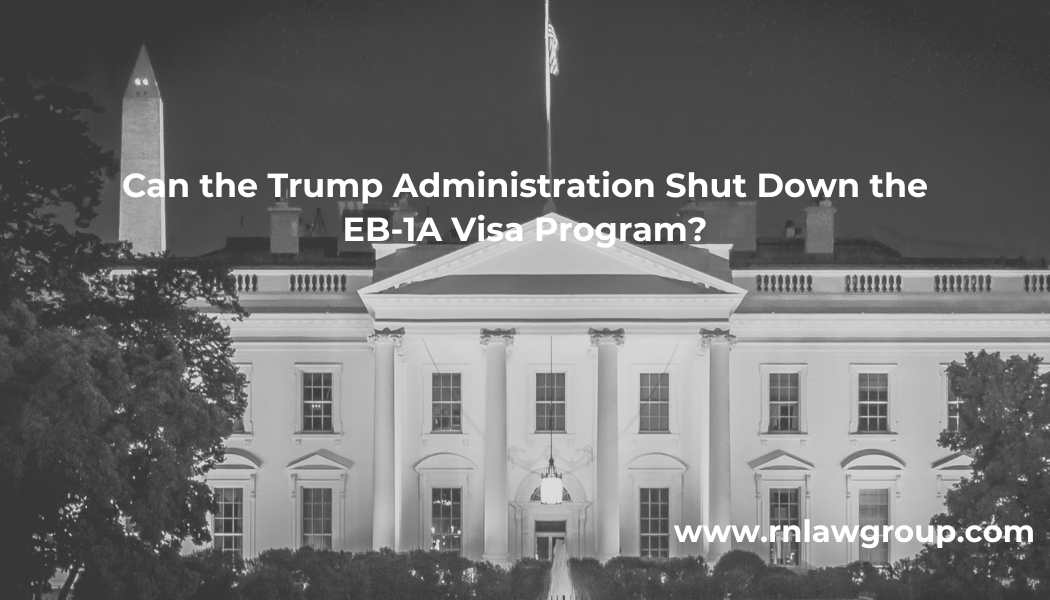
Can the Trump Administration Shut Down the EB-1A Visa Program?
An In-Depth Analysis of Legal Authority, Executive Powers, and Immigration Policy Implications
The EB-1A visa category, formally referred to as the “Employment-Based First Preference (EB-1A): Alien of Extraordinary Ability,” serves as a U.S. immigrant visa option aimed at attracting individuals who have exhibited extraordinary ability in various fields, including sciences, arts, education, business, or athletics.
Unlike the majority of employment-based green card categories, the EB-1A does not necessitate a labor certification or a job offer. This distinctive framework enables individuals to self-petition for lawful permanent residency based solely on their sustained national or international recognition. Given its significance to the U.S. economy, culture, and technological leadership, any proposal for its termination or limitation raises considerable legal, policy, and human rights issues.
During the Trump Administration, there are significant changes in immigration policy. President Trump prioritizes immigration reform as a key focus of his administration, addressing both unauthorized immigration and legal immigration pathways. The administration defends its stance by referencing economic protectionism, national security, and the safeguarding of American jobs. Legal immigration categories, particularly those related to employment-based green cards, undergo increased scrutiny. While the administration primarily concentrates on non-immigrant categories such as H-1B and L-1 visas, it also exerts pressure on high-skilled green card options, including EB-1A, by implementing new regulations, adjudication challenges, and executive orders.
The EB-1A visa is established by Congress through legislation. It is specifically codified under Section 203(b)(1)(A) of the Immigration and Nationality Act (INA). Since only Congress possesses the authority to create or abolish statutory immigration categories, the Executive Branch—regardless of whether it is under President Trump or any other president—cannot unilaterally terminate the EB-1A program. This principle is consistent with the doctrine of separation of powers, which assigns the creation of immigration categories to the legislative branch. Consequently, the Trump Administration cannot legally “shut down” EB-1A unless Congress enacts a law to that effect.
That being said, the administration possesses considerable authority to alter the operational dynamics of the program. For instance, U.S. Citizenship and Immigration Services (USCIS), which operates under the Department of Homeland Security, has the ability to interpret current laws and provide internal guidance that elevates the standards for EB-1A approvals. During the Trump administration, USCIS issued a greater number of Requests for Evidence (RFEs) and Notices of Intent to Deny (NOIDs) for EB-1A applications compared to prior years. These procedural obstacles illustrate a wider strategy: to decrease immigration figures by intensifying the evidentiary requirements placed on applicants. Even if the legislation itself remains unchanged, accessing the program becomes significantly more challenging.
The administration also employs presidential proclamations and executive orders to suspend or postpone immigration flows. A prominent example is Proclamation 10014, enacted by President Trump in April 2020, which halts the entry of specific immigrant categories under the guise of safeguarding U.S. workers during the COVID-19 pandemic. Although EB-1A is technically exempt in certain situations, the overarching effects of the proclamation greatly obstruct consular processing for EB-1A applicants located overseas. By shutting down embassies, ceasing visa interviews, and pausing immigration services under the pretext of public health, the Trump Administration effectively delays or halts EB-1A approvals for many months, particularly for applicants who are not already present in the United States.
Regulatory reform serves as an additional instrument in the administration’s initiative to restrict access. Through proposed rulemaking, the administration is considering a redefinition of what constitutes ‘extraordinary ability.’ The new definitions and interpretations are designed to elevate the evidentiary requirements, necessitating even more comprehensive documentation of accolades, media acknowledgment, substantial salaries, and evaluative work. While not all proposed regulations have been finalized, the objective is evident: to complicate the qualification process. These strategies are consistent with a broader trend in immigration policy during the Trump administration—reducing legal immigration not by altering the law, but by implementing stricter measures through changes at the administrative level.
Moreover, administrative bottlenecks present tangible obstacles. The Executive Branch governs hiring, resource distribution, and policy priorities for USCIS and the Department of State. During Trump’s tenure, significant positions remain vacant, funding is redirected towards enforcement, and processing delays have surged. EB-1A petitions that previously took 6 to 8 months now extend to a year or longer. These processing delays effectively act as a cap on green card issuances, including EB-1A. Although subtle, these bureaucratic maneuvers are remarkably effective in curtailing immigration without formally amending the law.
Nevertheless, the judiciary serves as a crucial counterbalance to executive overreach. Federal courts often step in to obstruct or overturn immigration actions that breach administrative procedures or constitutional tenets. For example, courts have annulled critical components of the Trump-era public charge rule, suspended certain travel bans, and challenged arbitrary regulatory changes that lack adequate justification. Should the administration seek to dismantle the EB-1A program through policy memos or hastily enacted regulations, courts have the authority to nullify such measures. Legal challenges under the Administrative Procedure Act (APA) emerge as a primary means to restrain executive power.
From a wider historical viewpoint, the EB-1A visa program is in line with the enduring American tradition of embracing global talent. Recipients of the EB-1A visa, including Nobel Prize laureates, technology entrepreneurs, Olympic champions, and internationally acclaimed scientists, frequently make substantial contributions to American society. This visa category serves the national interest by attracting individuals who foster economic development, cultural enhancement, and scientific progress. Eroding or hindering this program jeopardizes U.S. leadership in the global talent competition.
In spite of the Trump Administration’s restrictive stance, it has occasionally recognized the significance of high-skilled immigration. For instance, Trump’s 2020 “American AI Initiative” implicitly acknowledges that the U.S. must draw in top global intellects to sustain its technological superiority. Although the discourse surrounding immigration remains confrontational, the administration refrains from overtly dismantling programs like EB-1A, likely due to robust opposition from industries, academic institutions, and think tanks that depend on global talent. Major technology firms, research organizations, and advocacy groups strongly resist any actions that would hinder innovation pathways.
From a political standpoint, terminating the EB-1A program would alienate influential groups. Business executives, startup accelerators, educational institutions, and even military research organizations consistently support the ongoing endorsement of high-skilled immigration. The EB-1A program, in particular, symbolizes how the United States competes with other nations for the brightest minds. Limiting access to this visa would convey to the international community that the U.S. no longer appreciates or welcomes exceptional talent—an action that could lead to enduring diplomatic and economic consequences.
In conclusion, although the Trump Administration lacks the legal authority to terminate the EB-1A visa program without the involvement of Congress, it does have various mechanisms at its disposal to limit its operation. These mechanisms include tightening the criteria for adjudication, issuing executive orders, postponing consular services, and amending regulations. Collectively, these actions can greatly diminish the number of approvals and discourage potential applicants. However, such initiatives encounter judicial opposition, institutional resistance, and increasing political repercussions. Ultimately, the continuation of the EB-1A program is indicative not only of legal frameworks but also of a wider national dedication to openness, excellence, and international collaboration.
As the United States strives to maintain its competitive edge in scientific research, technological advancement, and cultural impact, it is essential to preserve access to the EB-1A pathway. This issue transcends the mere preservation of a visa program; it embodies the commitment to an America that welcomes exceptional individuals from around the globe to contribute, flourish, and shape the future.
By: Karim Jivani
Karim Jivani is an Associate Attorney at Reddy Neumann Brown PC who focuses on employment-based non-immigrant visas. Karim’s practice covers all phases of the EB-1A and EB-2 NIW visa process including filing petitions, responding to Requests for Evidence (RFE), and drafting motions and appeals. Karim has also worked on all aspects of H-1B, L-1, I-140, and VAWA petitions.
Karim earned his Bachelor of Business Administration degree from Houston Baptist University and his J.D. from University of Houston Law Center in May 2019. During his time in law school, Karim served as an Articles Editor for the Houston Business and Tax Law Journal, a student managed publication dedicated to scholarly research and the academic advancement of business, tax, and corporate law. He was part of the Civil Practice Clinic and Immigration Clinic, where he gained his passion for immigration law. As a child of immigrants, he hopes to continue to play a role in helping individuals start their life in the United States as well as help them navigate the complex and difficult immigration process. He is fluent in English, Urdu, and Hindi.

